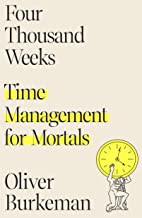Four Thousand Weeks: Time Management for Mortals
Four Thousand Weeks: Time Management for Mortals is a book that delves into the philosophy and practicality of time management in the context of human mortality. Authored by Oliver Burkeman, this work challenges conventional productivity and time management wisdom, proposing instead a more reflective and realistic approach to how we organize our lives, given the finite nature of time.
Overview[edit | edit source]
Four Thousand Weeks: Time Management for Mortals confronts the unsettling truth that the average human lifespan, spanning approximately 80 years, equates to about four thousand weeks. Burkeman uses this perspective as a starting point to explore the limitations and pressures that come with trying to manage our time effectively in the face of our inevitable mortality.
The book critiques the modern obsession with efficiency, urging readers to accept the limitations of their control over time. Instead of striving for an unattainable level of productivity, Burkeman suggests embracing these limitations to find a more meaningful and fulfilling way to live. The narrative weaves together insights from philosophy, psychology, and literature, offering a rich exploration of how to navigate life's inherent unpredictability and finiteness.
Themes[edit | edit source]
Several key themes emerge throughout Four Thousand Weeks: - **Acceptance of Limitations**: The book emphasizes the importance of acknowledging and accepting the finite nature of time and our capacity for productivity. - **Critique of Productivity Culture**: Burkeman challenges the prevailing culture that glorifies being busy and productive at all costs, suggesting it leads to a misallocation of our most precious resource: time. - **Finding Meaning**: A significant portion of the book is dedicated to exploring how individuals can find meaning and satisfaction in life by focusing on what truly matters, rather than attempting to do everything. - **The Role of Choice**: Four Thousand Weeks also discusses the role of choice in managing our time, advocating for more intentional decisions about how we spend our limited weeks.
Reception[edit | edit source]
The book has been well-received for its thought-provoking content and Burkeman's engaging writing style. Critics and readers alike have praised its insightful analysis and practical advice, which contrasts sharply with more traditional time management strategies that focus on maximizing efficiency.
Impact[edit | edit source]
Four Thousand Weeks has contributed to a broader conversation about the nature of work, productivity, and the search for meaning in the 21st century. It has encouraged readers to reconsider their relationship with time and how they define success and fulfillment in their lives.
See Also[edit | edit source]
| Four Thousand Weeks: Time Management for Mortals Resources | |
|---|---|
|
|
Search WikiMD
Ad.Tired of being Overweight? Try W8MD's physician weight loss program.
Semaglutide (Ozempic / Wegovy and Tirzepatide (Mounjaro / Zepbound) available.
Advertise on WikiMD
|
WikiMD's Wellness Encyclopedia |
| Let Food Be Thy Medicine Medicine Thy Food - Hippocrates |
Translate this page: - East Asian
中文,
日本,
한국어,
South Asian
हिन्दी,
தமிழ்,
తెలుగు,
Urdu,
ಕನ್ನಡ,
Southeast Asian
Indonesian,
Vietnamese,
Thai,
မြန်မာဘာသာ,
বাংলা
European
español,
Deutsch,
français,
Greek,
português do Brasil,
polski,
română,
русский,
Nederlands,
norsk,
svenska,
suomi,
Italian
Middle Eastern & African
عربى,
Turkish,
Persian,
Hebrew,
Afrikaans,
isiZulu,
Kiswahili,
Other
Bulgarian,
Hungarian,
Czech,
Swedish,
മലയാളം,
मराठी,
ਪੰਜਾਬੀ,
ગુજરાતી,
Portuguese,
Ukrainian
Medical Disclaimer: WikiMD is not a substitute for professional medical advice. The information on WikiMD is provided as an information resource only, may be incorrect, outdated or misleading, and is not to be used or relied on for any diagnostic or treatment purposes. Please consult your health care provider before making any healthcare decisions or for guidance about a specific medical condition. WikiMD expressly disclaims responsibility, and shall have no liability, for any damages, loss, injury, or liability whatsoever suffered as a result of your reliance on the information contained in this site. By visiting this site you agree to the foregoing terms and conditions, which may from time to time be changed or supplemented by WikiMD. If you do not agree to the foregoing terms and conditions, you should not enter or use this site. See full disclaimer.
Credits:Most images are courtesy of Wikimedia commons, and templates Wikipedia, licensed under CC BY SA or similar.
Contributors: Prab R. Tumpati, MD

